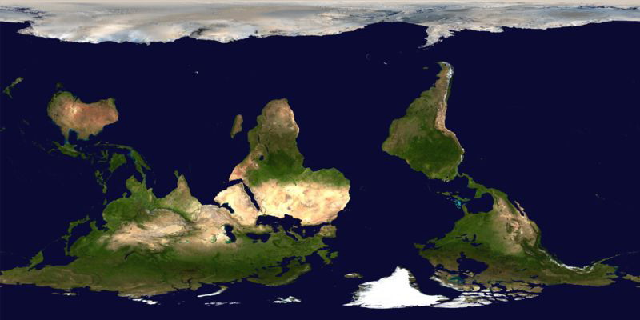Bouleversé by forgiveness
Tuesday, January 8th, 2013[ by Charles Cameron — not just “thinking outside the box” — how about upending the whole thing and seeing what shakes out? ]
.
A celebrated stanza by the Indian poet-saint Kabir — beloved of both Hindus and Muslims — asks:
Is there any guru in the world wise enough
to understand the upside-down Veda?
There’s a style of poetry used by Kabir and others to describe experience of the divine called “ulatbamsi” or the “upside down language” — and Linda Hess, Kabir’s great translator, writes of it as a language “of paradoxes and enigmas” — not too dissimilar, perhaps, to the koans or meditation paradoxes often encountered in zen training.
**
Boom! The French have the word “bouleversé” to cover the way we feel when suddenly our whole world seems turned upside down.
Maybe it’s a modern idea? Bob Dylan, I’m delighted to say, no longer belongs to Robert Zimmerman except for purposes of copyright — his songs have entered the cultural bloodstream. Here’s his version:
The battle outside ragin’
Will soon shake your windows
And rattle your walls
For the times they are a-changin’
The world often seems upside down, our values are often quite the reverse of what they might be if we had the kind of clarity that is implied in Samuel Johnson‘s celebrated quote:
Depend upon it, sir, when a man knows he is to be hanged in a fortnight, it concentrates his mind wonderfully.
And then there are those great ones for whom our world is manifestly unjust, manifestly topsy-turvy — or “through the looking-glass”, if you prefer.
I mean, what else can being “in the world, but not of it” be all about, if it’s not about a major shift in perspective?
**
I’m writing about this at such length because I just read one of those paragraphs that turns my own world upside down. It came in the middle of a long piece on “restorative justice” and it focuses on the power of forgiveness.
This particular paragraph describes how an Indian-American woman, Sujatha Baliga, came to see the unexpected power of forgiveness, and for her it occurred in a Buddhist context — but the power itself is beyond the boundaries of specific religions:
Baliga had been in therapy in New York, but while in India she had what she calls “a total breakdown.” She remembers thinking, Oh, my God, I’ve got to fix myself before I start law school. She decided to take a train to Dharamsala, the Himalayan city that is home to a large Tibetan exile community. There she heard Tibetans recount “horrific stories of losing their loved ones as they were trying to escape the invading Chinese Army,” she told me. “Women getting raped, children made to kill their parents — unbelievably awful stuff. And I would ask them, ‘How are you even standing, let alone smiling?’ And everybody would say, ‘Forgiveness.’ And they’re like, ‘What are you so angry about?’ And I told them, and they’d say, ‘That’s actually pretty crazy.’ ”
**
I like the dark blue “sky” and the “clouds” at the top of the map I began this post with — but then, I’m a mostly vertical human who seldom stands on his head, so it looks “natural” to me. But that’s simply a matter of my point of view.
I imagine maps like that one must please our friends “down under”.
**
A hat-tip to Hadar Aviram, whose California Corrections blog first pointed me to the article about Sujatha Baliga.






